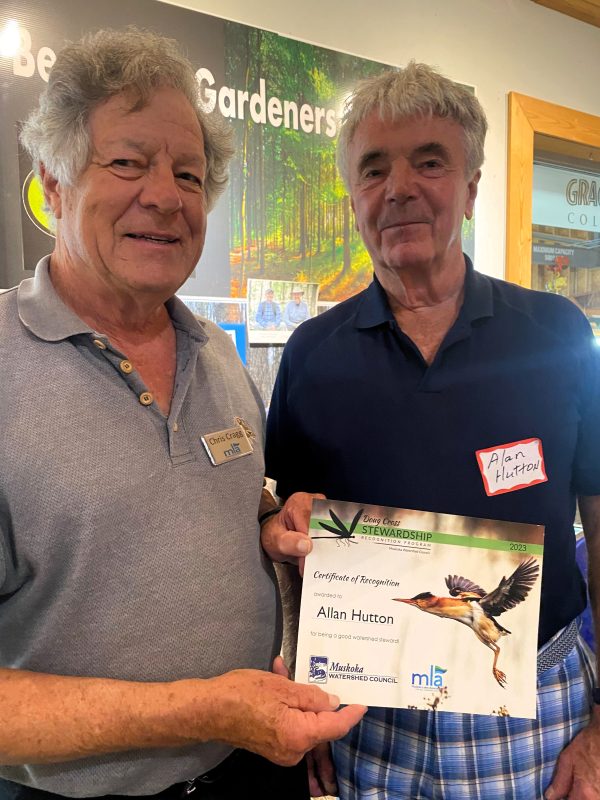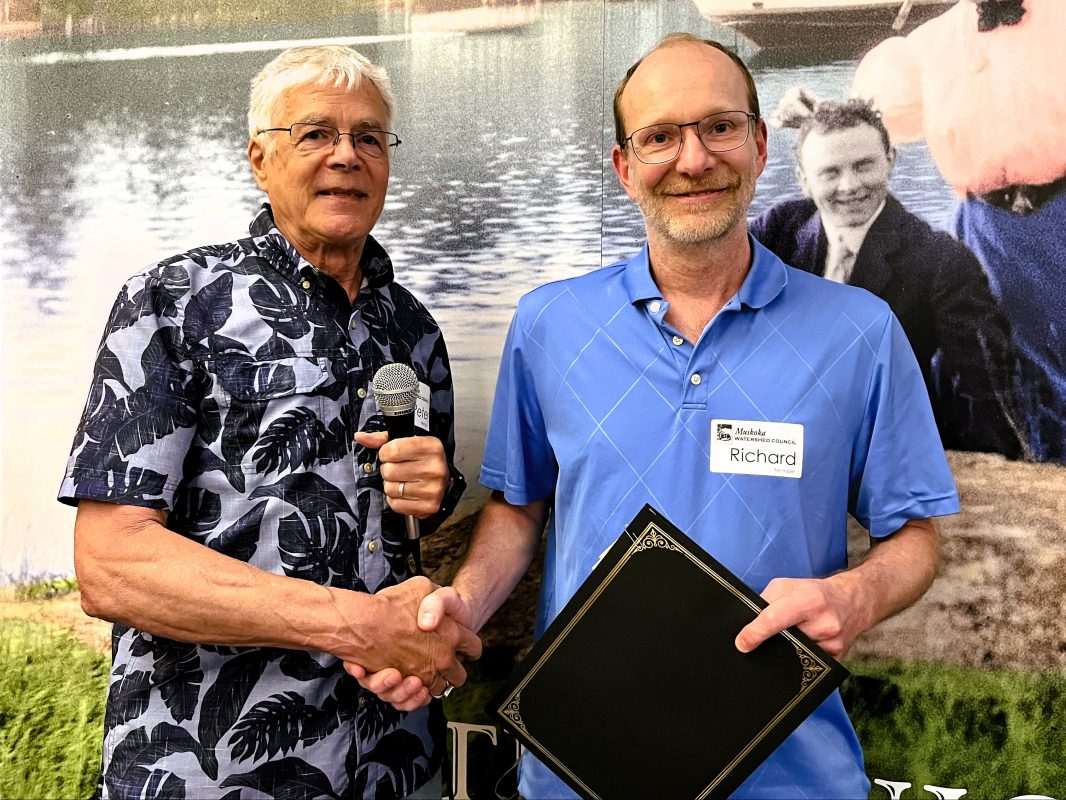MWC Helps Local Organizations Recognize Watershed Stewards
Muskoka Watershed Council is pleased to recognize a number of watershed stewards in 2023 through the Doug Cross Stewardship Recognition Program and the Robert Allen Memorial Stewardship Award. Worthy recipients were selected by their respective organizations for demonstrating a commitment to protecting Muskoka’s watersheds.
The Robert Allen Memorial Stewardship Award is presented annually to a resident or family on Three Mile Lake who demonstrates a commitment to good stewardship practices for the protection and/or rehabilitation of the shoreline environment and water quality of Three Mile Lake in the Township of Muskoka Lakes.
The recipient is chosen by the Three Mile Lake Association Board of Directors each year and the award is presented at the Annual General Meeting. The recipients for 2023, Paul Voulgaris & Lesley Melliship, received a certificate and a $100 gift card to Hidden Habitat native plant nursery. Congratulations Paul and Lesley!
The Doug Cross Stewardship Recognition Program helps local community and lake organizations across Muskoka’s watersheds recognize the dedication, effort, and good stewardship activities of their members. Organizations register in January to receive a Recognition Package to award to a deserving member of their organization. Each Recognition Package contains a Certificate of Recognition and a $50 gift card to Hidden Habitat native plant nursery in Kilworthy!

2023 Recipients
Bracebridge Horticultural Society | KAREN BOYER
Karen became a David Suzuki Butterflyway Ranger in 2021. She has since advocated for the planting of natural vegetation to form ‘pathways’ for butterflies and other pollinators throughout Bracebridge. She has spoken at Bracebridge Horticultural Society meetings many times and has distributed information at several public functions. Karen is an active member and Secretary of the Bracebridge Horticultural Society. Karen and her husband live on the shores of Lake Muskoka and are very conscious of the need for stormwater management and the importance of native vegetation on their property.
Brandy Lake Association | KEVIN TRIMBLE
Kevin, in addition to his extensive volunteer work as a director of MWC and Co-chair of the IWM Community Roundtable, also finds time to Chair the Brandy Lake Association Environment Committee and, as such, coordinates all of the association’s work on the various water monitoring and sampling programs. He has also mapped most of the main creeks coming into the lake, identifying areas where more attention should be given, and has provided the lake association with many years of updates on water sampling but also rainfall, land use changes in the watershed, and how climate change will affect our lake and its surroundings.
Kevin also spends a fair amount of time answering questions from folks on the lake and tries to reach out as much as possible to the kids on the lake, giving them a chance to learn about nature and the ecosystem of the lake whenever he can. He has recently recruited a teenager who lives seasonally on the lake into the water sampling crew, and we are excited that she is learning from an expert like Kevin.
Loon & Turtle Lakes Cottage Association | PETER & CAROL HELSTON
LTLCA selected Peter and Carol for this award for their exemplary habits of maintaining their shoreline to be as natural as possible. They have used natural stone for their pathway to the water’s edge and permitted all natural vegetation to grow freely without any trimming. In addition, Peter has contributed much time and personal energy to studying and monitoring water quality for decades now.
Muskoka Lakes Association | ALAN HUTTON

Alan is a stalwart of the Muskoka Lakes Association’s water quality program, having served and led for more than 40 years. He graduated from the University of British Columbia as a mechanical engineer and led a wide range of successful corporate and entrepreneurial boards.
Alan was a driving force in the fight against acid rain for Canada and Muskoka. Formerly commodore and vice president of the Muskoka Lakes Association, Alan became president of the Canadian Coalition on Acid Rain (CCAR), which launched in 1980 with 12 member groups and grew to include 52 member groups. Through judicious use of cutting-edge science, widespread media coverage, and coalition building, CCAR effectively lobbied governments in Canada and the United States to amend the U.S. Clean Air Act and establish corresponding regulatory action in Canada, in November of 1990.
While this was a major and highly significant step forward, acid smog days persisted in Muskoka until the early 2000s, when the Province of Ontario dismantled its coal-powered electricity generation facilities. Alan was also part of the Ontario Medical Association’s clean air advisory board, which doggedly pursued closure of the Ontario coal-fired generation facilities. All of Muskoka is indebted to Alan for his leadership and achievements on this issue.
Alan continues to be active as a water sampler in Bala Bay where he and his wife, Lindsay, three sons and two grandsons enjoy an 1890s summer home.
Muskoka Ratepayers’ Association | JIM BOYD
Jim’s interest in seeing that the forests and lakes of Muskoka are subject to proper and balanced management led him quickly to the Ratepayer’s Environment Committee. As a result of personal observation he identified problems with ice away systems. Winter can result in substantial changes to the shoreline of the lakes in our watershed.
Bubbler systems can cause main lake ice to disconnect early from the shoreline in the spring instead of melting gradually. This allows large masses of ice to float away striking the shore. This floating ice can push clay, soil and rock from the lake bed and shore up onto the land.
Jim’s observations showed that there was no control of design or size of ice away systems. There were systems on docks where none was warranted. There were unnecessary large areas of open water which were potential danger to the waterways and shorelines of Muskoka. Jim was motivated to learn as much as he could in an attempt to rectify this.
As Chair of the Environment Committee for many years, Jim took it upon himself to research regulations – or lack thereof – by meeting with engineers and dock construction companies. This led to further conversations with the OPP, Members of Parliament, and Fisheries and Oceans Canada. He also met with members of snowmobile clubs, the Muskoka Tourism and Marketing Association, delegated to Township and District councils, trying to get consensus on bubbler guidelines, and visited dozens of properties of owners concerned about the effects that bubblers would have on their shorelines. Finally, it was time to spring into action and begin to educate members on what he had learned.
Jim, in collaboration with the then President of the MLA, produced Bubbler Etiquette – a document that was circulated to all MRA and MLA members. It identified several suggestions for responsible use of bubblers, such as the use of a thermostat, a timer, proper signage, warning light, and having someone monitor your property. All of this in the hope of reducing the amount of open water around docks and shorelines in winter.
While Jim would say that the situation is improving, it is not perfect yet. In fact it is too soon to know what the environmental impacts will be. But it is a good start.
Muskoka Watershed Council | RICHARD LAMMERS

Richard joined MWC in 2012 and has contributed to many MWC projects since then, most notably participating on the Climate Change Sub-committee where he was instrumental in the development of the “Planning for Climate Change in Muskoka” publication released in 2016.
Richard’s professional background as a Research Associate Professor in the Institute for the Study of Earth, Oceans, and Space at the University of New Hampshire, studying the dynamics of global and regional-scale hydrology with an emphasis on human interactions within the hydrological cycle and on high latitude hydrological systems, means that he is the one MWC looks to when it’s time to use global climate change models to predict the likely impacts Muskoka will see as our climate changes.
More recently Richard has volunteered extensive amounts of time on IWM as a technical advisor for the District of Muskoka’s Making Waves initiative as well as sitting on MWC’s Community Roundtable. Richard has also used his expertise to develop the Climate Change section of the upcoming 2023 Muskoka Watershed Report Card.
Congratulations to all of the 2023 recipients and thank you for doing your part to protect our watersheds!
